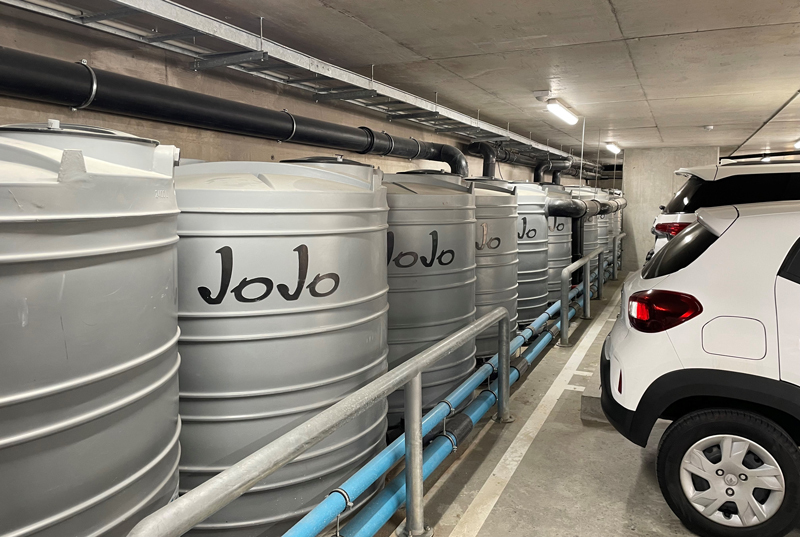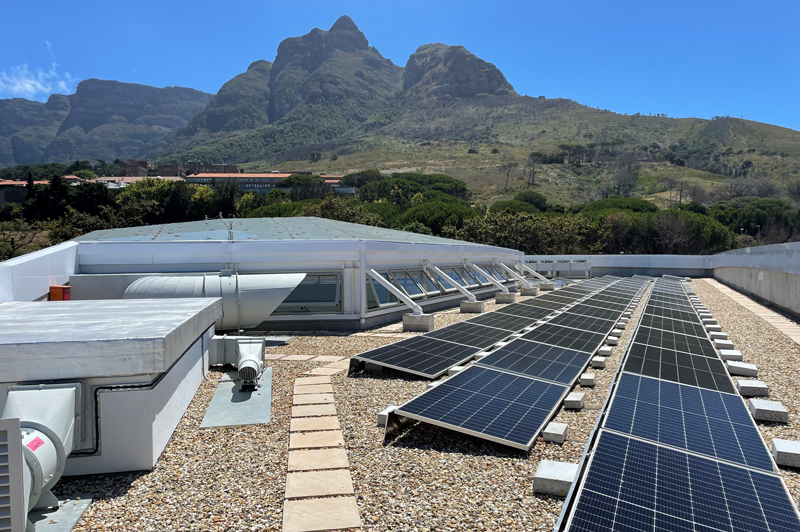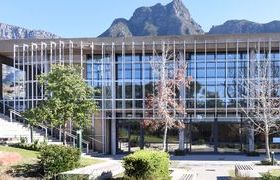Khusela Ikamva: Marked progress towards a water-sensitive campus
22 November 2023 | Story Helen Swingler. Photos Kirsty Carden. Read time 8 min.
Good progress has been made to help the University of Cape Town (UCT) become a water-sensitive campus, thanks to the Khusela Ikamva “Secure the Future” Sustainable Campus research project.
The R10 million project is in its third year and supports the environmental sustainability goals of UCT’s Vision 2030. It encompasses five research areas that are key to these goals: energy (carbon footprint), wildlife, waste, social responsiveness, and water.
Importantly, the initiative sees UCT’s campus as a living laboratory for research and harnesses a transdisciplinary community of practice. This broad community includes academic; and professional, administration and service staff; and students, particularly postgraduate students. Student bodies such as the Green Campus Initiative and the Students’ Representative Council also participate.
The successes of the Khusela Ikamva project are reflected in an annual progress report compiled for UCT’s Research Office.
Key projects
In her report, co-principal investigator of the water-sensitive campus component, the Future Water Institute’s Professor Kirsty Carden, said that considerable progress has been made during 2022/2023 – and in the experimentation that is now generating evidence to support the shift to a water-sensitive campus.
The report highlights six key projects concluded in the 2022/2023 period:
- a stakeholder map and project database
- an audit and report of water-use opportunities on campus
- the selection of sites for and co-design of living labs
- the establishment and monitoring of a living lab
- social acceptance surveys and extensive stakeholder engagement
- various peer-reviewed publications and workshops/seminars.
“This research work is being run in parallel with the roll out of UCT’s sustainable Water Management Strategy and the various capital projects that are included in that,” said Professor Carden. “We are building a solid evidence base for a more sustainable approach to water management on campus, through the various postgraduate studies and engagement efforts that are part of our theme.”
She added, “This also appears to be reflecting in the way in which water-related research and activity is happening at UCT. An indicator of this success is reflected in the recent Times Higher Education (THE) impact rankings.”
The impact rankings measure universities’ achievements in meeting the 17 United Nations Sustainable Development Goals (SDGs). UCT was ranked ninth for SDG 6, which is concerned with ensuring availability and sustainable management of water and sanitation for all.

Postgraduate projects
Having completed nine projects on water use and sustainable water management across campus, postgraduate students have produced the lion’s share of the research work, said Carden.
For example, a completed project by MSc (Eng) student Tsepiso Lepota examined prospects for stormwater harvesting at UCT. Another (ongoing) project by MSc (Eng) student Tariro Marekwa describes the development of a living lab for water reuse, using the Hasso Plattner School of Design Thinking Afrika (d-school Afrika) at UCT as a case study. Others examined greywater quality monitoring and risk assessment for non-potable use, greywater application in UCT residences, and monitoring of water quality for campus-based sustainable drainage systems.
Living lab
But the two main achievements have been the living lab site conceptualisation and the stakeholder map and project database, said Carden.
First, a decision was made to move from the establishment of a single living lab (in the New Engineering Building quad) to multiple living labs across UCT campuses. These will make use of the Internet of Things (IoT) for monitoring purposes (campus heat mapping, water levels, rainfall, humidity, etc).
The multiple living labs also include the research sites linked to the postgraduate student projects on IoT. One example is an MSc (Eng) project completed by Cameron Heale, titled “Application of Real-Time Control to Enhance Stormwater Harvesting”, at the UCT dam site.
“A more recent initiative is the collaboration effort with Environmental Humanities South (EHS) who are spearheading a proposal to develop a communal living lab space on the rooftop above EHS at the Humanities building, together with other work package streams from Khusela Ikamva and potentially also linked to the University of the Future initiative,” said Carden.
“We are in the process of establishing ‘virtual’ living labs across the campuses.”
“In addition, we are in the process of establishing ‘virtual’ living labs across the campuses – the development of signage (with QR codes linked to the Future Water website to begin with) that will demonstrate sustainable water management practices across UCT, as well as provide information on missed opportunities.”
Graduate interns assisted in developing the signs for the QR codes and the team has collaborated with UCT’s African Climate Development Initiative (ACDI) to align this with other efforts across campus. This is being brought together by a Khusela Ikamva interactive website led through a partnership with the Future Water Institute, the ACDI and the Environmental Sustainability Directorate in the Office of the Vice-Chancellor. It aims to support sustainable campus tours.
Stakeholder map and project database
The second key achievement has been the development of a stakeholder map and project database.
The stakeholder mapping and engagement aspects of the research project were conducted by a team of social-science-focused student researchers and interns who worked alongside postdoctoral research fellow Sithabile Hlahla and senior research officer Amber Abrams at the Future Water Institute.
The project database captures stakeholder involvement and survey responses.
“There are plans in place to link data on campus sustainability initiatives to the existing ‘Water Map’ as part of the Water Sensitive Design Community of Practice website that is hosted by Future Water,” said Carden.
Meetings with UCT’s Water Management Strategy consulting team are ongoing, with the Future Water Institute team providing input on wastewater treatment and stormwater management options for a proposed ‘green precinct’. This is to be developed on lower campus as a part of the UCT Water Management Strategy.
The idea is to create a decentralised wastewater and stormwater treatment facility that acts as a ‘green’ demonstration space while providing alternative water sources for non-potable purposes.
Challenges, engagement, funding
The main challenges of the water-sensitive campus project have been linked to the timing of specific research tasks and securing the relevant research personnel and students for each, said Carden.
The shift from a single living lab to multiple and virtual living labs has also meant that baseline surveys undertaken in the first year of the project will have to be reassessed, she said.
“This is because the emphasis is now on the potential/future for alternative water use, rather than people’s experiences in one dedicated living lab physical space. Current engagement processes are mainly around gauging people’s relationships with water conservation and reuse on campus.”
“Co-PIs have been required to demonstrate a commitment to inclusivity and transformation by embracing a diverse group of project participants.”
As is the case with all five Khusela Ikamva research projects, the water-sensitive campus project prizes inclusive engagement with the wider university community.
“Co-PIs have been required to demonstrate a commitment to inclusivity and transformation by embracing a diverse group of project participants,” said Carden.
To this end, several types of stakeholder engagement activities, such as workshops with students and staff, a focus group discussion with ground staff and a campus-wide survey, have taken place over the past year. These sought to understand perceptions of water use and conservation across the campus community – and to raise awareness about the Khusela Ikamva project.
Looking forward, Carden said that further additional funding opportunities are being explored, for example, from the Water Research Commission. This funding would be used to support the stormwater/greywater reuse and the living labs aspects of the research.
 This work is licensed under a Creative Commons Attribution-NoDerivatives 4.0 International License.
This work is licensed under a Creative Commons Attribution-NoDerivatives 4.0 International License.
Please view the republishing articles page for more information.










